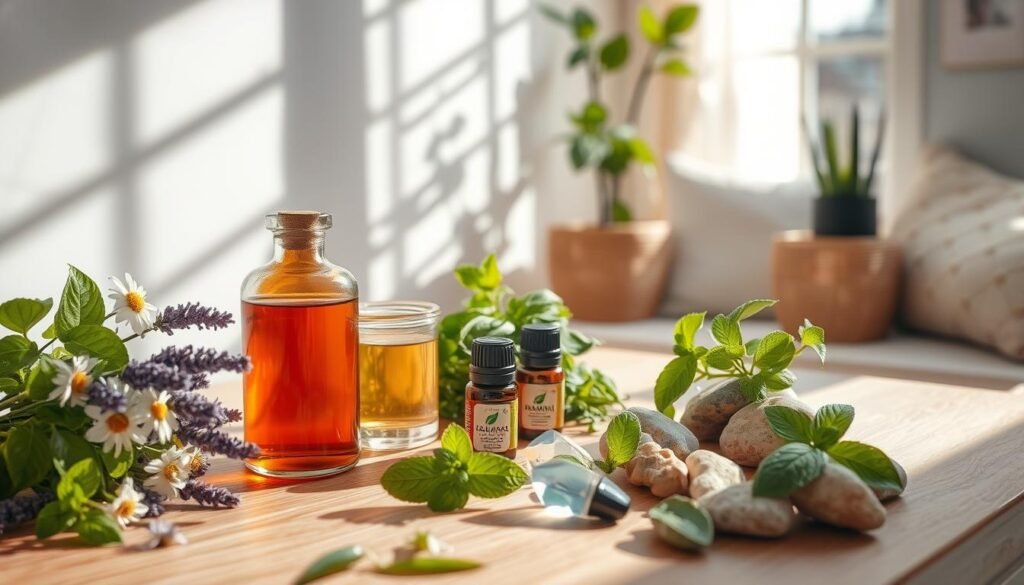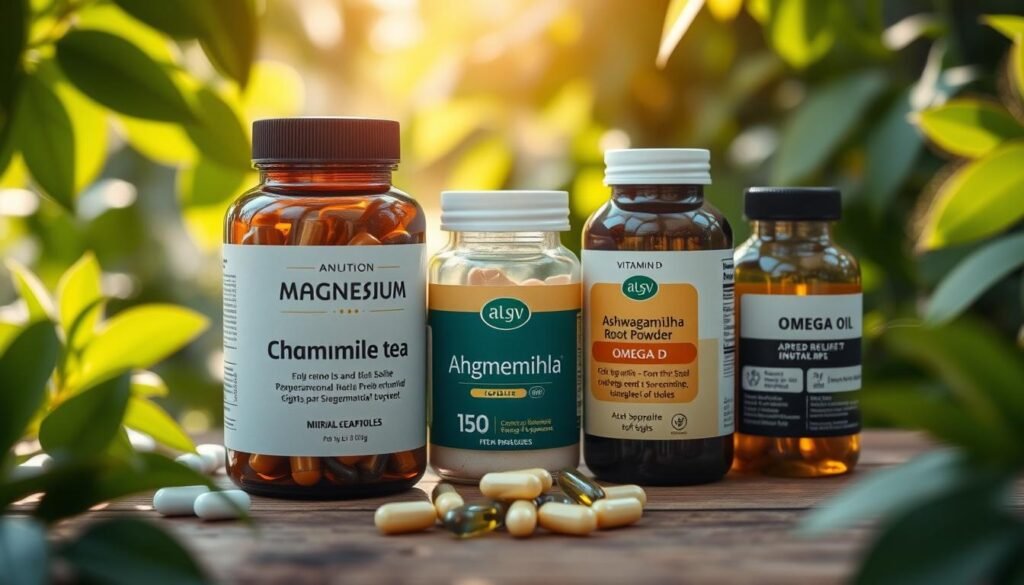Did you know that over 44 percent of U.S. adults—that’s more than 113 million people—suffer from anxiety symptoms? This info comes from the 2019 US National Health and Wellness Survey. It shows how widespread anxiety is. Anxiety doesn’t just affect our minds but leads to higher healthcare costs, depression, and sleep issues. Fortunately, certain vitamins can help fight these symptoms.
It’s often missed how important vitamins are for mental health, especially in easing anxiety. Studies show lacking nutrients like vitamin D and magnesium can raise anxiety levels. Surprisingly, over one-third of U.S. adults are low in vitamin D, and up to half lack enough magnesium. Understanding the connection between nutrition and mental health is key. Several vitamins can effectively support treatment through therapy and medication.
Delving into the science of vitamins for anxiety relief can be a relief itself. Knowing how to boost mental health through food choices brings hope. This article will focus on top vitamins and natural methods to manage anxiety. It’s a guide to help you take charge of your emotional health.
Key Takeaways
- 44 percent of U.S. adults experience anxiety symptoms, emphasizing the need for effective solutions.
- Vitamin D and magnesium deficiencies are common and connect to increased anxiety levels.
- Vitamins can act as complementary treatments alongside psychotherapy and medication.
- Incorporating the best vitamins for anxiety into one’s diet can improve mental health.
- Scientific research supports the efficacy of various vitamins and supplements for reducing anxiety.
Understanding Anxiety: A Brief Overview
Anxiety is a common mental health issue in the United States. About 44% of adults face symptoms of anxiety at some point. It comes in many forms, such as generalized anxiety disorder (GAD) and social anxiety. Around 6.8 million Americans struggle with GAD alone.
Anxiety affects both the mind and body. Globally, 16.6% of people will face an anxiety disorder in their lifetime. It’s vital to understand its widespread impact and recognize its symptoms.
- Psychological impacts, including feelings of dread and worry.
- Physical manifestations such as rapid heartbeat, muscle tension, and digestive issues.
- Increased prevalence among individuals already living with depression, with about 55 million people in the U.S. experiencing these co-existing conditions.
Managing anxiety often means changing your lifestyle. This can involve your diet and how much you exercise. It’s important to know when to get extra help. If you want to learn more about anxiety symptoms, check out this useful resource.
Common Symptoms of Anxiety Disorders
Anxiety disorders show up as many different symptoms that can change your daily life. You may feel physical and emotional signs. Physical symptoms like sweating, muscle tightness, and a quick heartbeat are common.
These physical signs can make it hard to tell if you have anxiety because they look like other health issues. You may also feel too much worry and fear, making you very stressed.
Anxiety can also make it hard for you to do well at work or in social settings. You might have trouble sleeping, which can make mental health issues worse. Knowing these symptoms is important for getting the right diagnosis. Treatments such as vitamins and changes in your lifestyle can help people with anxiety.
| Physical Symptoms | Emotional Symptoms |
|---|---|
| Sweating | Excessive Worry |
| Muscle Tension | Fear |
| Rapid Heartbeat | Difficulty Concentrating |
| Fatigue | Restlessness |
| Sleep Disturbances | Feelings of Impending Doom |
Research shows that not having enough vitamins can lead to anxiety. Taking the right supplements can help you feel better. For more information on how herbal and vitamin supplements can help, click.
The Importance of Vitamins for Mental Health
Vitamins greatly impact our mental health. Many studies show a strong link between vitamin intake and emotional wellness. People with anxiety and depression often lack B vitamins and vitamin D.
Vitamins help our brain work better and keep our mood steady. The vitamin B complex, for example, boosts thinking skills. Not having enough of these vitamins can make you feel irritable or anxious. Very low folate levels are linked to more depression signs; folic acid can make antidepressants work better for women.
Vitamin D is also crucial for mental health. Not having enough vitamin D can lead to anxiety and depression. Getting enough vitamin D helps make serotonin. This improves how we feel emotionally.
Eating vitamins is a key step toward better mental health. They can be especially helpful for those dealing with anxiety. They offer a natural way to manage emotional health struggles.
Exploring Natural Remedies for Anxiety Relief
Anxiety affects many people today, with about 31.1% of U.S. adults facing it at some point. Natural remedies present an alternative way to find relief, alongside usual treatments. These holistic methods have helped many people in their journey towards feeling better.
Making changes in your lifestyle is key to managing anxiety naturally. Exercising can lower anxiety by 20% to 40%. Mindfulness and deep breathing can also make a big difference. They have been shown to cut anxiety symptoms by more than 60%, by increasing oxygen flow to the brain.

Some natural supplements can help with anxiety too. Chamomile, for instance, has calmative effects and can reduce anxiety symptoms. After a 12-week study with chamomile, people saw major improvements. Also, using lavender oil through aromatherapy has helped reduce anxiety by 39% in surgical patients.
Including different natural remedies, like herbal treatments and diet changes, can help create a comprehensive plan. Supplements such as magnesium, vitamin B, and omega-3 fatty acids can be beneficial. Probiotics also play a role by promoting gut health, which can impact mental well-being.
There are many natural remedies out there for those facing anxiety. Combining these with traditional treatments allows for a personalized approach. It’s all about finding what works best for you on your path to managing anxiety.
Best Vitamins for Anxiety
Vitamins play a key role in managing anxiety, helping people live better lives. Some vitamins stand out for their anxiety-relief abilities. Let’s explore the top vitamins for anxiety and their benefits.
Vitamin D: The Sunshine Vitamin and Mood Regulator
Vitamin D is essential for keeping our mood balanced. Lack of it can make us feel anxious or depressed. A 2020 study found that taking 1,600 IU of Vitamin D daily helped people keep their levels steady without much sun. This was unlike the placebo group, who felt more stressed.
Vitamin B Complex: Essential Nutrients for Stress Management
Vitamins B1, B6, and B12 are crucial for handling stress well. Studies show that nurses low in B6 and B12 faced more mental health challenges. Higher levels of these vitamins led to better mental health.
Taking a lot of B6 can lessen stress and anxiety. A study showed that people feeling down saw their anxiety drop when they took B6. This was confirmed by clinical tests.
Adding Vitamin B6 supplements might help the mind, especially with other treatments.
Magnesium: A Key Mineral for Reducing Anxiety
Magnesium is crucial for our well-being and helps calm us down. Not having enough can increase anxiety, highlighting the need for the right amount. Studies link magnesium with lowered stress, especially when taken with vitamin B. Those who took both noticed less stress, showing how vital magnesium is in managing anxiety.
| Vitamin/Mineral | Primary Benefit | Recommended Intake |
|---|---|---|
| Vitamin D | Mood regulation | 600-1,600 IU daily |
| Vitamin B Complex | Stress management | Varies by type (B6: 1.3-2.0 mg) |
| Magnesium | Anxiety reduction | 310-420 mg daily |
Top Supplements for Anxiety Relief
Anxiety affects many in the U.S., with over 44 percent experiencing symptoms. This is more than 113 million people. Looking into the top supplements for anxiety relief can offer much-needed support. Many choose natural options like vitamins and minerals for better emotional health.
A key issue is the lack of vitamin D in many people’s diets. Research shows that taking 1600 IU of vitamin D for six months can lessen anxiety symptoms. It ranks high among the best anxiety supplements.
Magnesium is often missed but essential. About half of Americans don’t get enough, impacting many body functions and mental health. Not having enough can cause anxiety, headaches, and sleep problems. More magnesium in your diet could help improve your mental well-being.
Omega-3 fatty acids are making waves for their benefits on anxiety. Studies found that 2000 mg of omega-3 daily can reduce anxiety significantly. This points to their importance in treating anxiety.
The B vitamins are vital for a good mood. B1, B2, B3, B6, and B12 help make neurotransmitters, crucial for emotional balance. For improving supplements for mental health, these are key.
Herbs like ashwagandha are seeing positive results, too. Studies note its ability to cut stress and boost energy. It’s earning its place in anxiety treatment methods.

In closing, a mix of vitamin D, magnesium, omega-3, and B vitamins can aid anxiety symptoms. These best anxiety supplements lay the groundwork for better mental health and reducing anxiety effectively.
Research on Vitamins and Anxiety Reduction
Studying how vitamins aid in managing anxiety stresses the need for a nutritious diet. Scientific studies have discovered a link between certain vitamins and reduced anxiety. This connection supports better mental health.
Scientific Evidence Supporting Vitamin E
There’s a lot of talk about the vitamin E benefits for emotional wellness. Its antioxidant qualities are key in fighting oxidative stress, which affects our minds. One study found that people taking enough vitamin E felt less anxious. This suggests vitamin E can protect our brains from the inflammation linked to anxiety.
Studies on Omega-3 Fatty Acids and Anxiety
Omega-3 studies highlight omega-3 fatty acids’ role in lessening anxiety. A review of trials showed people taking 2000 mg of omega-3s daily saw their anxiety symptoms drop. Eating foods like wild salmon and albacore tuna, rich in omega-3s, aligns with this. They help control the brain chemicals that impact our mood.
Maintaining a diet full of nutrients can ease anxiety symptoms. For more on how vitamins influence health, explore this research on anxiety vitamins. Also, see the impact of vitamin deficiencies on mental health here.
| Vitamin/Nutrient | Benefits | Recommended Daily Intake |
|---|---|---|
| Vitamin E | Antioxidant properties, reduces anxiety symptoms | 15 mg (22.4 IU) |
| Omega-3 Fatty Acids | Supports neurotransmitter regulation, reduces anxiety | 250-500 mg EPA/DHA combined |
| Vitamin D | Regulates mood, alleviates anxiety | 600 IU (15 mcg) |
Natural Supplements That Support Anxiety Management
Many people look for natural ways to ease anxiety. They often choose supplements as an alternative or addition to regular treatments. Popular choices include chamomile and L-theanine. Both are known for their soothing effects and success in reducing anxiety symptoms.
Chamomile and Its Calming Properties
Chamomile has been valued for centuries for its benefits. It is usually drunk as tea or taken as a supplement. Its mild sedative effect helps with relaxation and lowering anxiety.
A study shows regular use significantly improves calmness. Its components, like apigenin, work in the brain similar to anti-anxiety drugs. Chamomile is a great natural option, providing relief without the common drug side effects.
L-theanine: A Natural Sedative Found in Tea
L-theanine is an amino acid found mostly in green tea and is celebrated for anxiety relief. It’s special because it relaxes without making you sleepy. This makes L-theanine popular for those seeking natural anxiety support.
Studies show it helps increase focus and lower stress by boosting calming brain signals. Drinking tea with L-theanine or taking supplements can really help those dealing with anxiety during their day.

| Supplement | Benefits | Dosage Recommendations |
|---|---|---|
| Chamomile | Reduces anxiety, promotes relaxation | 1-3 cups of chamomile tea or 200-400 mg of extract |
| L-theanine | Enhances relaxation and focus | 100-200 mg per day |
Healthy Lifestyle Choices to Complement Vitamin Intake
A balanced approach to anxiety goes beyond just vitamins. It includes a healthy lifestyle. By using mindfulness practices, staying active, and eating well, one can build a peaceful and strong mindset.
The Role of Exercise in Reducing Anxiety Symptoms
Regular exercise helps in fighting anxiety. It boosts the release of endorphins, making you feel happier. It also lowers stress hormones, like cortisol. This improves your mood. So, trying activities such as jogging, dancing, or brisk walking can really help.
Mindfulness and Diet: A Holistic Approach
Mindfulness practices like meditation, deep breathing, and yoga work well with a healthy diet. They help calm your mind and stop worry. Eating foods loaded with fruits, veggies, whole grains, and omega-3s is key. Together, these practices can greatly lower anxiety and elevate life quality.
Consulting with Healthcare Professionals
Working with healthcare providers is key to handling anxiety well. It means getting professional advice on anxiety and how vitamins and supplements can help. This tailored plan lets people add essential nutrients to their care. Managing anxiety, especially generalized anxiety disorder (GAD), is vital. GAD impacts around 6.8 million Americans.
Some vitamins and supplements can help lessen anxiety symptoms. For example, a study in 2018 showed that 800 mg of folic acid, 1 mg of vitamin B12, and 25 mg of vitamin B6 daily reduced anxiety and depression in two months. Also, magnesium has helped improve anxiety symptoms in many studies.
Not having enough Vitamin D could lead to more anxiety and depression. That’s why it’s crucial to have regular check-ups to keep an eye on your blood levels. Omega-3 fatty acids and probiotics also play a role in controlling anxiety. So, adjusting your diet with a professional’s help can make a big difference.
Everyone is different, so a plan that fits one person might not fit another. Healthcare providers can make a plan that suits you well. This way, you can be sure that the vitamins and supplements you take don’t mess with your medications. It makes managing anxiety safer and more efficient.
Conclusion
Understanding anxiety is essential as it affects around 6.8 million Americans. Research shows vitamins can help manage it well. Many studies find vitamins and supplements crucial in lessening anxiety symptoms. This makes them vital for managing anxiety effectively.
Anxiety management also involves lifestyle changes along with vitamins. Over 71% of studies show positive results with nutrients like magnesium. Herbal remedies like ashwagandha are also promising. But, getting advice from a professional is key.
Improving magnesium intake or using herbal supplements can help. This multi-faceted approach aids in building emotional strength. With the right vitamins and lifestyle changes, people can reduce anxiety. And they improve their well-being too.